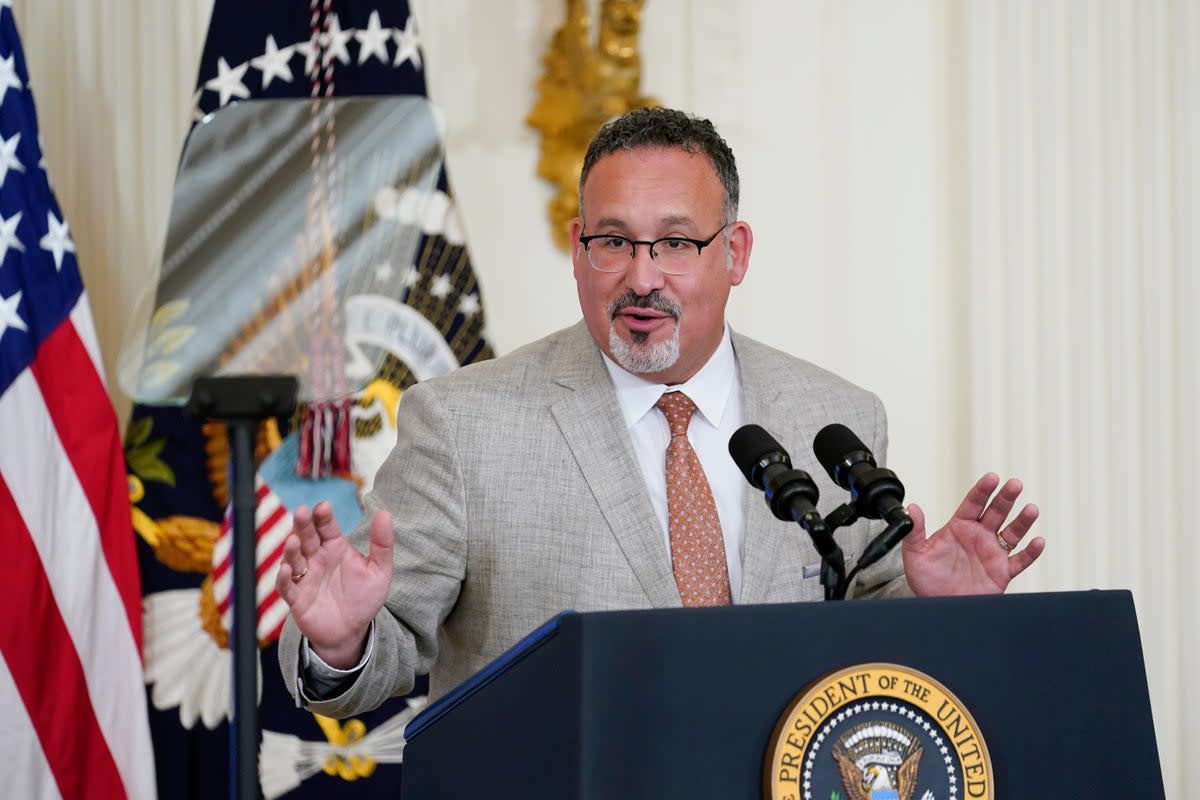Biden admin proposes changes to handling of sexual misconduct cases in K12 schools and colleges under Title IX

- Oops!Something went wrong.Please try again later.
The Biden administration on Thursday proposed new regulations that would prohibit educational institutions from discriminating against transgender students and roll back some Trump-era rules governing how colleges and universities handle complaints of sexual harassment or sexual assault under Title IX, the landmark 1972 law prohibiting sex discrimination in education.
The Department of Education said the 700-page proposal would “restore vital protections for students in our nation’s schools which were eroded by controversial regulations implemented during the previous Administration,” including regulations implemented by former education secretary Betsy DeVos which President Joe Biden had criticised as amounting to “a green light to ignore sexual violence and strip survivors of their rights” during his 2020 presidential campaign.
"As we celebrate the 50th Anniversary of this landmark law, our proposed changes will allow us to continue that progress and ensure all our nation's students – no matter where they live, who they are, or whom they love – can learn, grow, and thrive in school,” Secretary of Education Miguel Cardona said in a statement announcing the new proposal. “We welcome public comment on these critical regulations so we can further the Biden-Harris Administration's mission of creating educational environments free from sex discrimination and sexual violence”.
The new regulations, which were rolled out a half-century after Title IX was signed into law by then-president Richard Nixon, would require institutions receiving federal funding — including elementary and secondary schools, colleges, and universities — to provide accommodations to transgender students, including allowing them to use restrooms corresponding to their gender identity, requiring that they be addressed by their preferred pronouns, and taking action to keep them from being subject to bullying and harassment.
While the Biden administration proposal would extend Title IX protections to transgender students at all levels of education, it does not address the question of whether schools must allow transgender students to participate on athletic teams which correspond to their gender identity rather than their biological sex.
The question of transgender students’ participation in sport has become a hot-button issue in recent months, with many Republican-led states enacting laws to prohibit transgender girls from playing on girls’ sports teams. The education department said it would conduct a separate rulemaking procedure to address whether Title IX requires schools to allow transgender students to play on the sports teams which align with the gender identity.
Amit Paley, the CEO of the Trevor Project, a LGBT+ mental health advocacy group, praised the Biden administration proposal in a statement.
“School should be a place where students learn and are comfortable being themselves, not a source of bullying and discrimination. The Trevor Project is thankful to the Department of Education for working to protect LGBTQ students, especially transgender and nonbinary students, who have been facing a relentless wave of attacks,” he said.
He added that the new rules were an “important step forward” and said the Senate should still act to pass the Equality Act, a Democratic-sponsored bill which would codify civil rights protections for LGBT+ people into law.
The Biden administration proposal’s revision of regulations governing how schools handle complaints of sexual harassment or assault will once again require them to decided cases using a “preponderance of the evidence” standard under which a school may find a person responsible for harassment or assault if it determines that it is “more likely than not” that the conduct in question occurred.
Under the Trump-era regulations, schools had to employ a higher standard requiring “clear and convincing evidence” to impose sanctions on a student or employee accused of misconduct.
Advocates for sexual assault survivors have taken issue with the requirement that schools use a higher standard because it made it more difficult to sustain complaints. But the new regulations allow institutions to continue to use a “clear and convincing” standard if it is used in other types of disciplinary proceedings.
The new regulations also require schools to provide students or staff accused of misconduct with due process protections that presume parties not responsible until both accuser and accused have an opportunity to present “relevant evidence to a trained, impartial decisionmaker” with the aid of an adviser, including an attorney.
Schools must also provide for procedures that allow the decision-maker in sexual misconduct cases to assess the relative credibility of accuser and accused. If schools allow for a live hearing before such a decision-maker, each party’s adviser must be allowed to cross-examine any witnesses presented and ask the other party questions, “including questions challenging credibility”.
The inclusion of due process protections in the new regulations comes after years of litigation brought by male students who accused schools of discriminating against them in grievance procedures implemented under a previous set of regulations promulgated during the Obama administration.
Those rules, which were rolled back under Ms DeVos, also required schools to use a “preponderance of the evidence” standard to adjudicate misconduct cases, but without the detailed due process protections in the Biden administration proposal.
Human Right Campaign Legal Director Sarah Warbelow said the Biden administration’s proposed change to misconduct rules “gets at the heart of what Title IX is supposed to do — protect students from sexual assault, sexual harassment and discrimination while on campus”.
“These protections are particularly critical for female and LGBTQ+ students. A strong Title IX regulation, with clear expectations for how educational institutions are expected to behave, is an absolutely essential component of ensuring that our schools are places to learn and that all students can be safe in educational settings,” she added.

